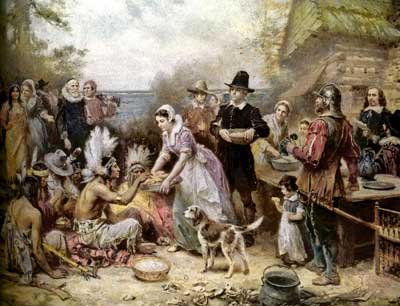In 1620, a boat called Mayflower filled with more than one hundred people sailed across the Atlantic Ocean to settle in the New World. This religious group had begun to question the beliefs of the Church of England and they wanted to separate from it. The Pilgrims settled in Plymouth what is now in the state of Massachusetts.

Their first winter in the New World was difficult. They had arrived too late to grow many crops, and without fresh food, half the colony died from disease. The following spring the Iroquois Indians taught them how to grow corn (maize), a new food for the colonists. They showed them other crops to grow in the unfamiliar soil and how to hunt and fish.
In the autumn of 1621, bountiful crops of corn, barley, beans and pumpkins were harvested. The colonists had much to be thankful for, so a feast was planned. They invited the local Indian chief and 90 Indians.
In following years, many of the original colonists celebrated the autumn harvest with a feast of thanks. After the United States became an independent country, Congress recommended one yearly day of thanksgiving for the whole nation to celebrate. George Washington suggested the date November 26 as Thanksgiving Day. Then in 1863 Abraham Lincoln asked all Americans to set aside the last Thursday in November as a day of thanksgiving*.
Thanksgiving is a time for tradition and sharing. Even if they live far away, family members gather for a reunion at the house of an older relative. All give thanks together for the good things that they have. In this spirit of sharing, civic groups and charitable organizations offer a traditional meal to those in need, particularly the homeless. On most tables throughout the United States, foods eaten at the first thanksgiving have become traditional.
Turkey, corn (or maize), pumpkins and cranberry sauce are symbols which represent the first Thanksgiving. Now all of these symbols are drawn on holiday decorations and greeting cards.
from: http://homeschooling.about.com/cs/unitssubjhol/a/thanksday.htm
Vocabulary:
to settle = letelepedni
to question the belief of the Church of England = megkérdőjelezni az Anglikán Egyház hitét, tanítását
crops = termények, termések
colony = kolónia, csoport
corn (maize) = kukorica (US and BrE)
colonist = gyarmatosító
unfaniliar soil = ismeretlen termőföld
bountiful = bőséges
barley = árpa
pumpkin = tök
to harvest = aratni
feast = lakoma, ünnepség
the local Indian chief = a helyi indián törzsfőnök
to set aside = félretenni, fenttartani vmit vmire
reunion = újratalálkozás
charitable organizations = jótékonysági szervezetek
(those) in need = rászorulók
cranberry = áfonya
A bejegyzés trackback címe:
Kommentek:
A hozzászólások a vonatkozó jogszabályok értelmében felhasználói tartalomnak minősülnek, értük a szolgáltatás technikai üzemeltetője semmilyen felelősséget nem vállal, azokat nem ellenőrzi. Kifogás esetén forduljon a blog szerkesztőjéhez. Részletek a Felhasználási feltételekben és az adatvédelmi tájékoztatóban.






